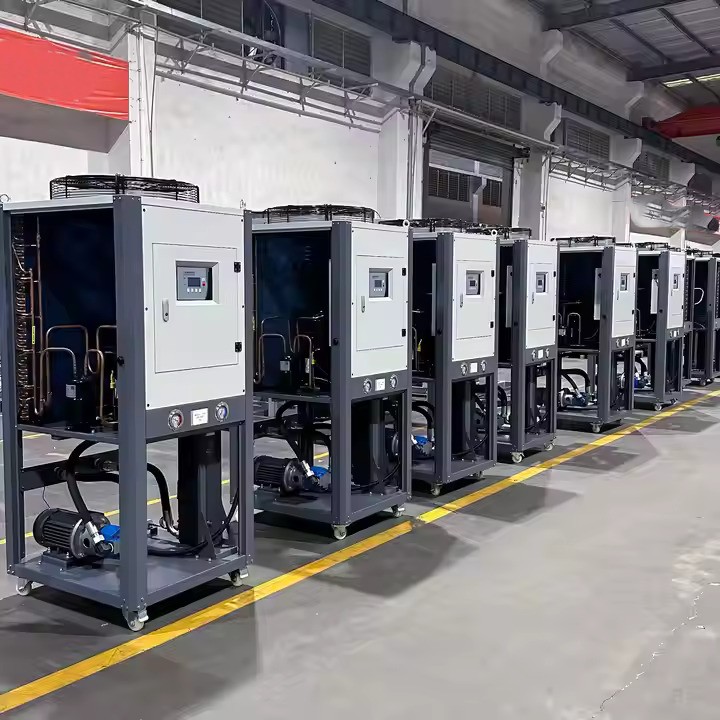Introduction
Hydraulic systems play a vital role in the operation of CNC (Computer Numerical Control) machines, providing the necessary power for precise movements and operations. However, maintaining the optimal temperature of the hydraulic oil is crucial for the smooth functioning of these systems. Overheated hydraulic fluid can cause reduced efficiency, increased wear on components, and even failure of critical parts. Hydraulic oil chillers are specifically designed to regulate the temperature of hydraulic fluids, ensuring that CNC machines operate at their peak performance. By integrating efficient cooling systems, CNC machine operators can prevent overheating, improve precision, and extend the life of their equipment.
Importance of Temperature Control in CNC Machines
- Prevents Overheating: CNC machines rely heavily on hydraulic systems to operate moving parts with precision. Overheating of hydraulic fluid can reduce the performance and accuracy of these systems.
- Prevents Contamination: High temperatures can degrade hydraulic fluid, leading to contamination and increased wear on hydraulic components.
Cooling Process
- Heat Exchange Efficiency: Hydraulic oil chillers use various heat exchange mechanisms, such as air-cooled or water-cooled systems, to maintain a consistent temperature of the hydraulic fluid. The temperature of the oil needs to be controlled typically between 35°C to 45°C for optimal operation.
- Chiller System Design: High-efficiency chillers for CNC machines are designed with precision in mind. They feature quick response times, preventing overheating of hydraulic fluids during extended operation, which is especially critical in high-demand machining processes.
Energy Efficiency
- Low Power Consumption: Modern hydraulic oil chillers are designed to be energy-efficient, reducing operational costs. Many chillers for CNC machines now feature energy-saving compressors and variable speed fans.
- Adaptive Control: Newer models use adaptive control systems that adjust the chiller’s performance based on the load and temperature of the hydraulic system, further reducing energy consumption.
Types of Hydraulic Oil Chillers for CNC Machines
- Air-Cooled Chillers: These are often compact and used in environments where water availability is limited. Air-cooled chillers use fans to dissipate heat, making them a practical choice for CNC machines operating in smaller workshops.
- Water-Cooled Chillers: These offer higher cooling capacities and are more efficient in larger operations where space and water resources are available. Water-cooled chillers are better suited for heavy-duty CNC machines that require consistent, high-level cooling.
Integration with CNC Systems
- Automated Control: Hydraulic oil chillers are integrated into the CNC system to monitor the fluid temperature and make real-time adjustments. This can prevent damage to sensitive CNC components due to thermal stress.
- Remote Monitoring: Some advanced models feature IoT integration, allowing for remote monitoring of the hydraulic fluid temperature and performance. This can alert operators to issues before they become major problems.
Maintenance Considerations
- Filtration: Regular maintenance of the chiller includes checking and replacing the filters that prevent contamination of the hydraulic fluid. Clean fluid is essential for the longevity and proper function of both the chiller and the CNC machine.
- Regular Inspections: Checking the condenser coils and evaporators for dirt buildup ensures optimal performance of the chiller. Routine inspections of refrigerant levels are also necessary to avoid cooling inefficiencies.
Benefits to CNC Machines
- Increased Precision: Consistent temperature control enhances the precision of CNC machining, as it reduces the chances of thermal expansion or contraction of machine parts.
- Prolonged Equipment Life: By preventing the hydraulic fluid from overheating, the chiller reduces wear on hydraulic components, thereby increasing the overall lifespan of the CNC machine.
- Reduced Downtime: Hydraulic oil chillers help reduce the chances of system failures caused by overheating, thus improving machine uptime and productivity.
Environmental Considerations
- Low Environmental Impact: Many modern hydraulic oil chillers are designed to be environmentally friendly by using refrigerants with low global warming potential (GWP) and reducing water and energy consumption.
Conclusion
Incorporating hydraulic oil chillers into CNC machine operations is essential for maintaining optimal performance, reliability, and efficiency. These chillers not only regulate temperature but also prevent potential issues such as fluid degradation, contamination, and equipment overheating. With advancements in energy-efficient designs, easy maintenance, and remote monitoring capabilities, modern hydraulic oil chillers offer a significant boost in reducing operational downtime and improving the longevity of CNC machines. Ultimately, the investment in a high-quality hydraulic oil chiller ensures smoother operations, better productivity, and enhanced precision in the manufacturing process.

